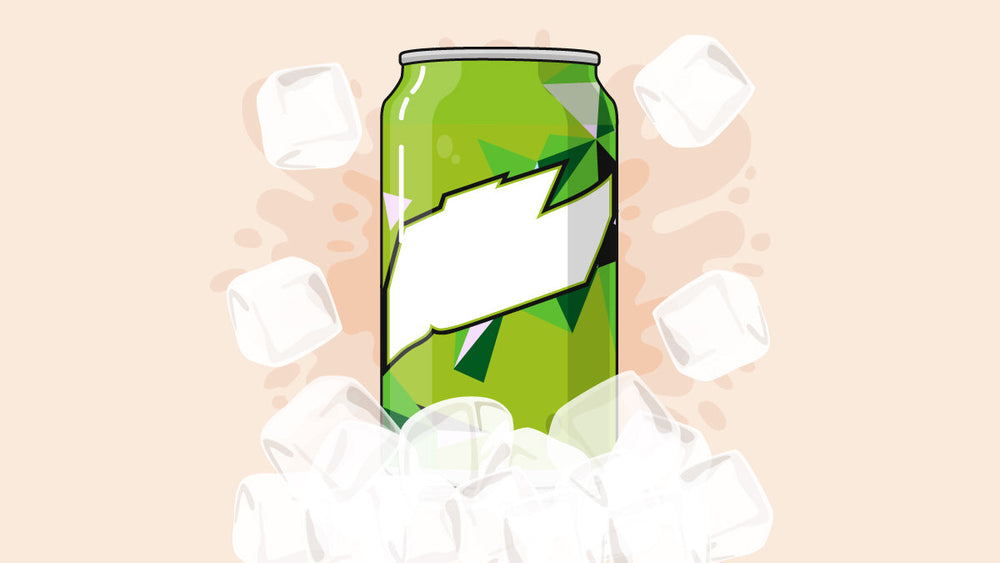When it comes to soda, Mountain Dew stands out as having one of the most caffeinated formulas around.
While the exact amount depends on the size and flavor, the caffeine content of various Mountain Dew drinks usually falls between 55 mg and 135 mg.
In this post, we’ll break down what that means and explore how Mountain Dew compares to other caffeinated beverages.
Comparing the Caffeine In Mountain Dew Drinks
Here’s a breakdown of the most popular Mountain Dew drinks and their caffeine levels.

Mountain Dew vs. Other Energy Drinks: Caffeine Content
The electric, citrus-infused flavor isn’t the only thing that makes Mountain Dew unique. It also packs a serious caffeine punch — a serving contains about 55 mg of caffeine. Below, we’ll explain how that compares to some of the most popular sodas and energy
Caffeine Content of Common Sodas & Energy Drinks:

Mountain Dew vs. Coffee: Caffeine Content
Mountain Dew is often compared to another caffeine-rich beverage — coffee — but it does not contain more caffeine.
While a 12 oz can of regular Mountain Dew has 55 mg of caffeine, the average 8 oz cup of coffee contains 80-100 mg. To help illustrate the difference more clearly, 8 ounces of Mountain Dew has a little under 37 mg of caffeine.
Caffeine Content of Various Coffee Preparations

Caffeine’s Risks & Side Effects
Most healthy adults can safely consume up to 400 milligrams of caffeine, or seven 12 oz cans of Mountain Dew, daily. Keep in mind that this varies from person to person, as age, gender, and underlying medical conditions can impact caffeine tolerance.
Consuming excessive amounts of caffeine puts you at risk of developing a number of unpleasant side effects, including:
- Insomnia
- Anxiety
- Increased heart rate
- Upset stomach
- Headache
- Chest pain
- Heart palpitations
In extreme cases, overconsumption of caffeine can lead to more life-threatening medical issues.
Although uncommon, the severity of the symptoms often requires immediate medical attention. They include confusion, hallucinations, difficulty breathing, and uncontrollable movements [1].
FAQs: Caffeine Content in Mountain Dew
Still have questions about the caffeine content in Mountain Dew? Below, we’ll go through some of the ones we come across most often.
1. Are there any caffeine-free Mountain Dew flavors?
While most Mountain Dew formulas have caffeine, Caffeine-Free Diet Mountain Dew contains none. That makes it an excellent option for anyone looking to limit caffeine consumption. But it’s important to note that Caffeine-Free Diet Mountain Dew is not widely available and can only be found in certain regions.
2. How much Mountain Dew is too much?
Due to its high sugar content, consuming too much Mountain Dew can also lead to the following health issues:
- Diabetes
- Obesity
- Dental problems
- Heart disease
- Fatty liver disease [2]
But Mountain Dew’s caffeine content isn’t the only problem. At 46 grams per 12 oz can, Mountain Dew is exceptionally high in sugar.
According to the American Heart Association, women should consume no more than 25 grams of added sugar daily, and men should try to stay under 36 grams [2]. With these guidelines in mind, it’s best to keep Mountain Dew consumption to a minimum.
3. Is Mountain Dew safe for pregnant women?
According to experts, pregnant women should limit their daily caffeine intake to under 200 mg.
Drinking more than 200 mg a day puts expectant mothers at risk of:
- Miscarriage
- Birth defects
- Premature labor
- Reduced fertility [3]
However, caffeine isn’t the only reason women should avoid Mountain Dew during pregnancy. Mountain Dew also contains a lot of sugar and artificial additives, many of which have been linked to health complications. So, while the occasional Mountain Dew is fine, pregnant women should avoid making it a daily habit [4].
4. What happens when you mix Mountain Dew with alcohol?
Although Mountain Dew was initially created to be mixed with moonshine, it’s important to be aware of the potential consequences.
Both sugar and caffeine can interact with alcohol and mask its intoxicating effects. As a result, you’re more likely to overindulge or develop alcohol poisoning. Mixing alcohol and Mountain Dew can also contribute to alcohol’s dehydrating effects and cause a more severe hangover.
5. Can Mountain Dew cause a caffeine addiction?
Unfortunately, any drink that’s high in caffeine can potentially lead to caffeine addiction. Because it’s a stimulant, caffeine activates the reward centers in your brain. As a result, regular consumption can lead to physical dependence.
Symptoms of caffeine addiction include:
- An inability to reduce or control caffeine consumption
- Withdrawal symptoms like headaches, depression, and anxiety
- Severe cravings
References
- Ágoston C, Bernáth L, Rogers PJ, Demetrovics Z. Stress, caffeine, and psychosis-like experiences-A double-blind, placebo-controlled experiment. Hum Psychopharmacol. 2022 May;37(3):e2828. doi: 10.1002/hup.2828. Epub 2021 Nov 18. PMID: 34792804.
- Lakin H, Sheehan P, Soti V. Maternal Caffeine Consumption and Its Impact on the Fetus: A Review. Cureus. 2023 Nov 4;15(11):e48266.
- Substances of Concern during Pregnancy. Accessed June 7, 2024.









